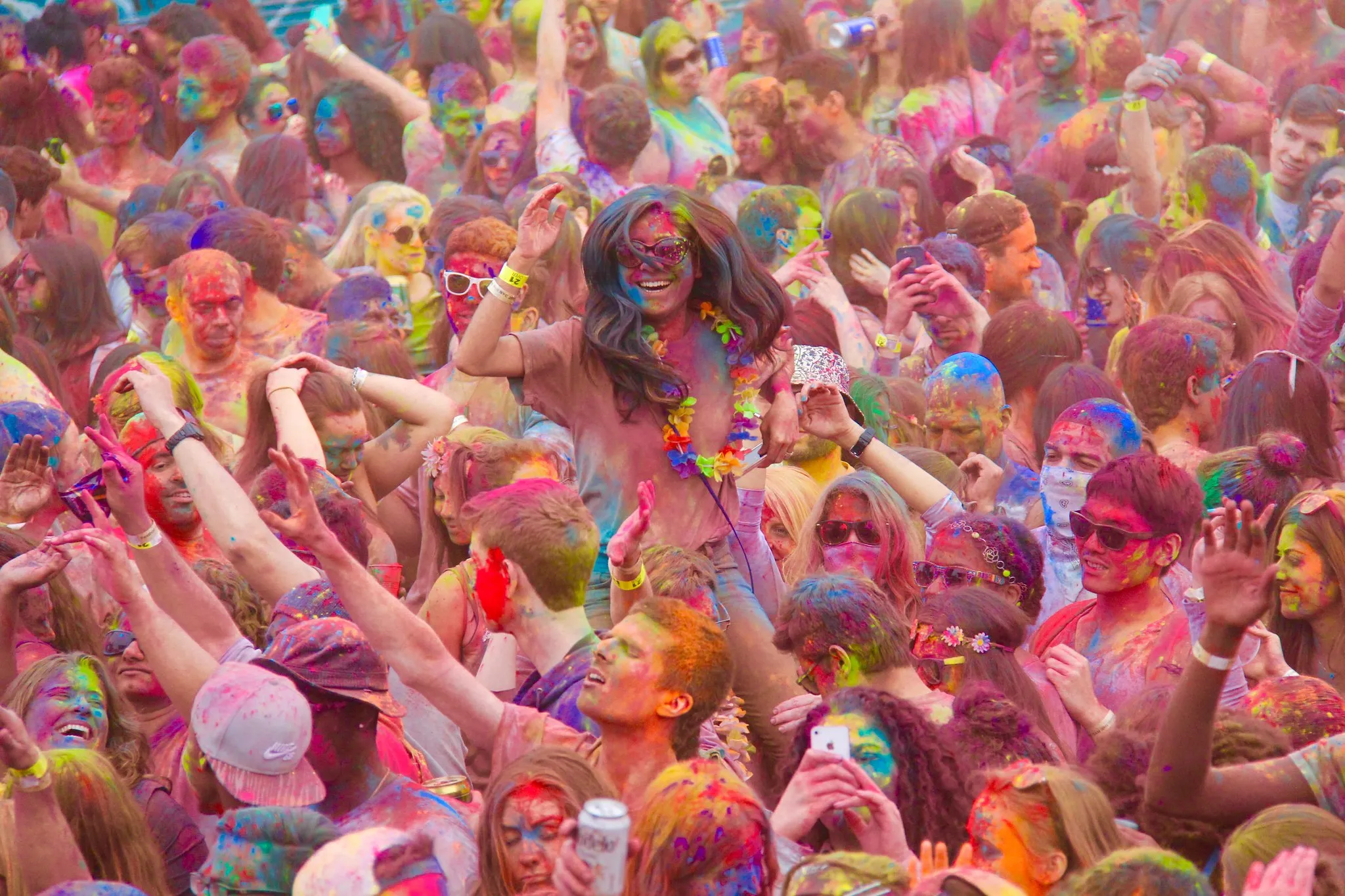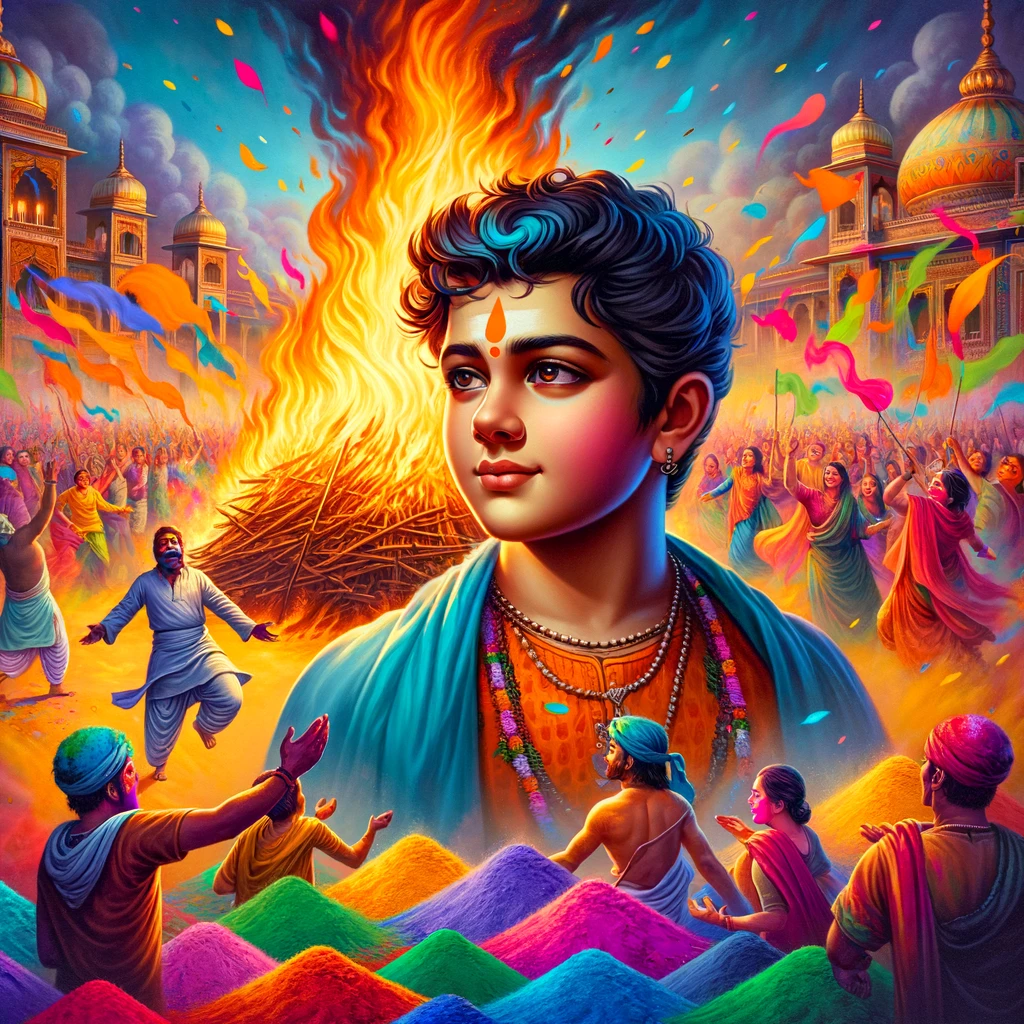Holi: A Celebration of Unity, Renewal, and Righteousness
Hinduism is one of the oldest religions in the world. It has a rich culture and deep beliefs. Dharma is at its heart. Dharma means living a righteous life. It guides how people behave and helps keep the universe in order. Hindu festivals show this culture and spirituality. They are important for Hindus. Festivals bring people together and help them remember their traditions.
The Role of Dharma in Hindu Festivals
Dharma is very important in Hindu festivals. It is about doing what is right and living well with others and nature. Festivals help people remember Dharma. They teach lessons about life, kindness, and duty. For example, Diwali teaches about light winning over darkness. This means good winning over evil. Holi celebrates friendship and forgiveness. These festivals help people live by Dharma’s teachings.
Celebrating Hindu Cultural and Scientific Heritage Through Festivals
Hindu festivals also celebrate India’s science and culture from a long time ago. Hindus were ahead in astronomy and maths. Festivals often are on special days that match the stars. This shows Hindus’ knowledge of astronomy.
For example, Makar Sankranti happens when the sun moves to a new zodiac sign. It marks the start of warmer days. This festival shows how Hindus used their understanding of the sun and stars. It is a time to thank the sun for its energy and life it gives.
In these sections, we see how Hindu festivals are not just celebrations. They are deep in meaning. They teach about Dharma, bring people together, and show respect for nature and the universe. They also remind us of the scientific knowledge of ancient Hindus.
Multifaceted Dimensions of Hindu Festivals: Celebrating Nature, Divinity, and Life
Agricultural Cycle: Hindu festivals are often aligned with the agricultural calendar, celebrating sowing, harvesting, and seasonal changes. Pongal, Baisakhi, and Onam, for instance, are harvest festivals expressing gratitude for the bounty of the land.
Astronomical Events: Hindu festivities are tied to lunar and solar cycles. Makar Sankranti and Vasant Panchami mark celestial events, while Diwali aligns with the new moon of Kartik.
Honoring Deities: Each deity in the Hindu pantheon has a festival dedicated to them. Navaratri, Ganesh Chaturthi, and Janmashtami allow devotees to honor and seek blessings from divine figures.
Historical Significance: Festivals like Rama Navami and Krishna Janmashtami commemorate significant events from Hindu texts, emphasizing the importance of righteous actions.
Life Cycle Rites: Various ceremonies from birth to death, such as Namakarana and Vivaha, mark significant life events, reinforcing cultural traditions.
Spiritual Concepts: Guru Purnima celebrates the role of spiritual teachers, while the Kumbh Mela underscores the spiritual significance of sacred bathing.
Victory of Good over Evil: Festivals like Dussehra and Diwali symbolize the triumph of righteousness over malevolence, embodying the eternal struggle between good and evil.
Renewal and Cleansing: Celebrations like Chhath Puja focus on purification and renewal, emphasizing spiritual cleansing and the removal of impurities.
Community and Family Bonding: Festivals like Raksha Bandhan strengthen familial bonds and foster community unity through shared rituals and celebrations.
Teaching and Preservation of Traditions: Festivals like Guru Purnima serve as platforms for transmitting Hindu cultural values, and traditions to future generations.
Seasonal Changes: Basant Panchami and Makar Sankranti celebrate seasonal transitions, invoking deities associated with fertility and prosperity.
Lunar-Based Fortnightly/Monthly Occurring Fastings/Festivals: Regular fasts and festivals like Amavasya, Purnima, Ekadashi, and Sankashti Chaturthi occur fortnightly or monthly, aligning with lunar phases and serving as opportunities for spiritual purification and devotion.
Environmental Stewardship and Social Welfare in Hindu Festivals
Hindu festivals are not only vibrant celebrations of faith and culture but also carry profound messages of environmental stewardship, social welfare, and the holistic well-being of all beings. Through practices such as fasting (Upavasa), almsgiving (Daan), and reverence for nature, these festivals encourage sustainable living and compassion towards all forms of life.
Fasting and Daan
Fasting during festivals like Ekadashi, Shivaratri, and Navaratri is not merely a spiritual exercise but also a lesson in self-discipline and empathy towards those who lack food. The practice of Daan, especially significant during Diwali and Makar Sankranti, encourages generosity towards the less fortunate, fostering a sense of community and shared well-being.
Environmental Awareness
Several Hindu festivals underscore the importance of environmental conservation:
Ganga Dussehra celebrates the reverence for rivers, particularly the Ganges, highlighting the importance of clean, sacred water bodies. It inspires actions towards cleaning and protecting rivers.
Vat Purnima and Tulsi Vivah are celebrations that involve the worship of trees and plants, emphasizing the critical role of flora in sustaining life and promoting ecological balance.
Nag Panchami honors snakes and by extension, all wildlife, advocating for biodiversity and the protection of natural habitats.
Caring for All Beings
The festival of Govardhan Puja, part of Diwali celebrations, involves offering gratitude to the mountain Govardhan for its life-sustaining resources. It teaches the value of conserving natural resources and caring for animals, as Krishna is depicted as a protector of cows.
Social Welfare
Annakut celebration, where mountains of food are offered in temples and later distributed among the public, serves as a reminder of the importance of sharing resources and ensuring no one goes hungry.
Bhai Dooj and Raksha Bandhan foster sibling love and protection, extending the protective instinct towards society at large, advocating for the safety and respect of all individuals, especially women.
Global Contributions
Hindu festivals also contribute globally by spreading awareness about the interconnectedness of all life and the importance of living in harmony with nature. Through international participation in festivals like Earth Day, aligned with the ethos of environmental protection seen in Hindu festivals, the global community becomes aware of sustainable practices rooted in ancient traditions.
Moving from a broader understanding of Hindu festivals’ impact on environmental and social well-being, we now transition to a vivid illustration of these principles through the celebration of Holika Dahan and Holi. These festivals exemplify the triumph of good over evil, showcasing the deep-rooted values of faith, unity, and renewal within the Hindu tradition.
The Festival of Holika Dahan and Holi

(https://hinduinfopedia.in/wp-content/uploads/2024/03/17546145249_0eb2aa30d9_k_holi_Festival_Flickr.webp) Credit https://flickr.com]
Holika Dahan and Holi together symbolize the victory of good over evil in Hinduism, rooted in the story of a demon king, Hiranyakashipu. Despite his demand for sole worship, his son Prahlad’s devotion to Lord Vishnu remains unshaken. Hiranyakashipu’s plans to kill Prahlad, with the help of his sister Holika’s fire-immunity boon, backfire dramatically. Prahlad survives unharmed due to his faith, while Holika perishes in the flames she thought would protect her.
This event is commemorated by lighting bonfires during Holika Dahan, symbolizing the burning away of evil. The following day, Holi, is celebrated with splashes of color and water, embodying joy, love, and the mending of relationships. This vibrant festival encourages forgiveness, unity, and the renewal of social ties, transcending barriers to bring people together in a spirit of true communal harmony.
Holi marks the onset of spring, embodying hope and renewal. It’s a time when the community gathers in a shared celebration, reinforcing bonds and fostering a collective sense of joy and positive transformation. Holika Dahan and Holi thus offer profound reflections on faith, the triumph of good, unity, and the essence of communal harmony and renewal.
Reflections on Holi
Following Holika Dahan, the festival of Holi is celebrated with great enthusiasm. It is a vibrant festival marked by the throwing of colored powders and water, symbolizing joy, love, and the renewal of relationships. Holi encourages people to let go of past grievances, embrace forgiveness, and celebrate life’s colors in unity.
The festival promotes social harmony by bringing together people from different walks of life to share in the festivities. It is a time when social barriers dissolve, and individuals come together, reflecting the essence of true community spirit.
Holi also signifies the arrival of spring, a season of hope and joy, reinforcing the message of renewal and growth. The festival’s lively and inclusive celebrations foster a sense of belonging and collective happiness, making it a powerful occasion for rejuvenation and positive change.
In essence, Holika Dahan and Holi serve as profound reminders of the power of faith, the importance of goodness, and the strength found in unity and forgiveness. These festivals not only commemorate ancient legends but also offer timeless lessons on resilience, compassion, and the enduring capacity for renewal in the human spirit.
Symbolic Victory of Good Over Evil
Holika Dahan and Holi symbolize the victory of good over evil, of devotion over ego. The fire of Holika Dahan is identified as cleansing, burning away evil and bringing in a new start. Holi’s vibrant colors fill the world with joy and love, showing that good always wins.
Promoting Social Harmony, Joy, and Renewal
Holi is identified as a time of joy, play, and laughter. It brings people together, strengthening bonds and promoting forgiveness. It’s a day when enemies become friends, and families reunite in celebration. This festival teaches the values of love, trust, and renewal. People clean their homes and hearts, ready to start fresh.
In essence, Holi is not just about colors; it’s a deep reminder of the power of true devotion and the importance of community and harmony. It encourages us to let go of past grievances and look forward to new beginnings with open hearts.
The Spiritual and Cultural Tapestry of Hindu Festivals
Hindu festivals are very different. They show the rich culture and spirituality of Hinduism. Each festival has its own story and reasons. They are not just fun. They are also about learning and sharing.
Festivals like Diwali, Holi, and Navaratri are not just about gods. They are also about people coming together, helping each other, and remembering important ideas. These festivals make the community strong. They keep the culture alive.
Hindu festivals show dharma, which means living the right way. They teach people to be good, to respect each other, and to care for the world. This makes Hindu culture strong and helps it to keep going, even when things change.
Conclusion
Hindu festivals hold a pivotal role beyond just preserving the rich tapestry of Hindu culture; they serve as bridges fostering global understanding and harmony. Through the universal values of love, righteousness, and renewal that these celebrations promote, they invite people from all walks of life to partake in their vibrant traditions, breaking down barriers across cultures.
These festivals, embodying deep-rooted traditions and stories of triumph and devotion, teach important lessons about life, the significance of community, and the power of good over evil. They are a testament to the enduring spirit of Hinduism, encouraging us to embrace love, practice righteousness, and continually seek renewal in our lives and communities.
By celebrating festivals like Diwali, Holi, and Navaratri, Hindus not only keep their cultural heritage alive but also share with the world a message of hope, joy, and the possibility of rebirth. In doing so, they contribute to a global tapestry of cultural understanding, promoting values that resonate universally—love, peace, and the triumph of light over darkness.
Thus, as we celebrate these ancient festivals, we are reminded of the common humanity that binds us all. They encourage us to look beyond our differences and work together towards a world marked by greater understanding, peace, and shared joy. In essence, Hindu festivals are not just celebrations of religious faith but are beacons of universal values that have the power to unite us all in a harmonious and spiritually enriched life.
Feature Image: Click here to view the image.

[…] Holi: A Celebration of Unity, Renewal, and Righteousness […]